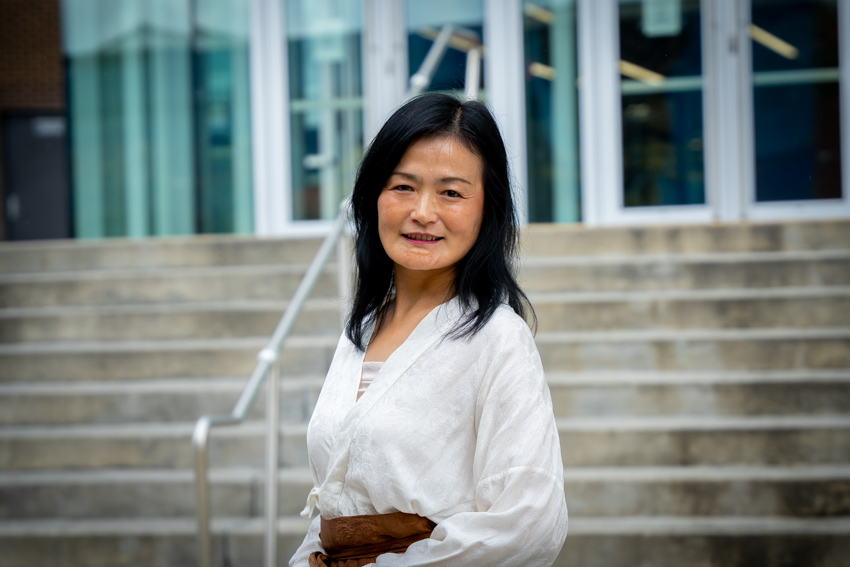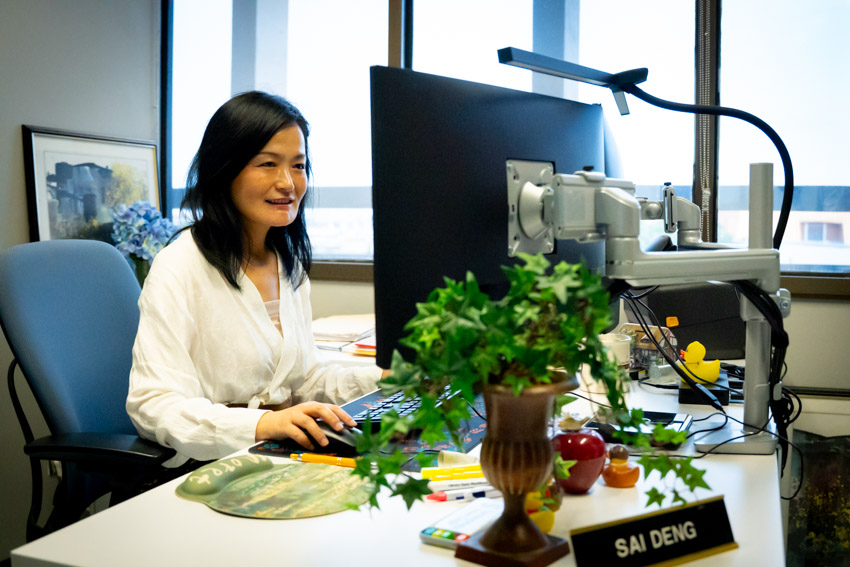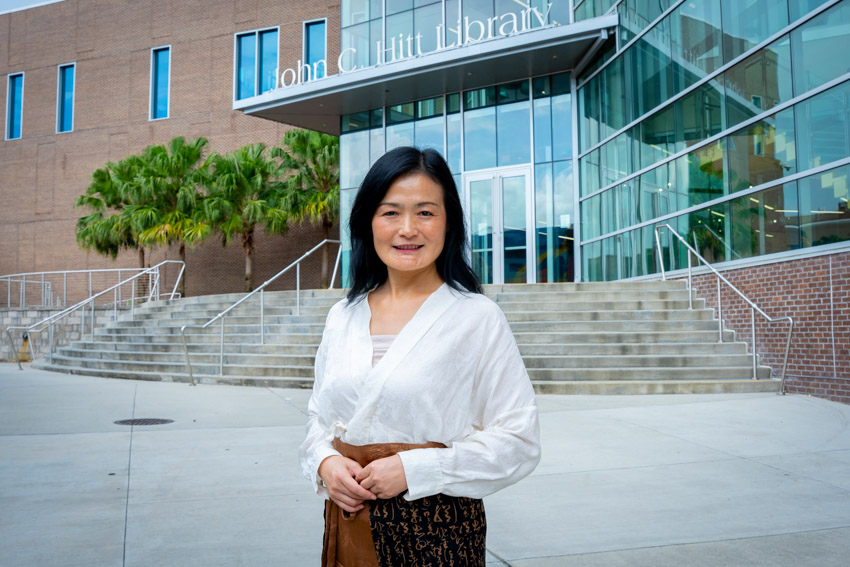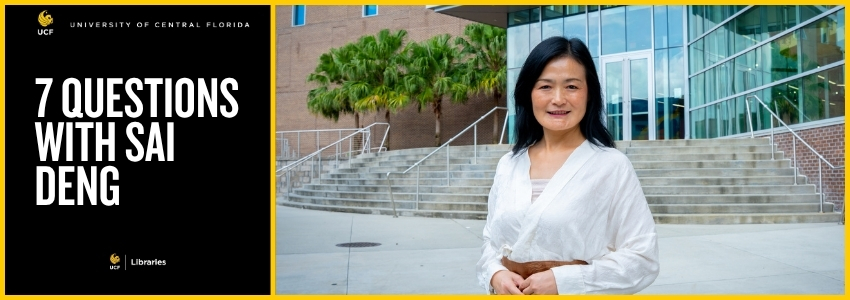7 Questions with Sai Deng!
All Libraries Posted: July 28th, 2025As our talented Metadata Librarian, Sai plays a key role in making the library’s digital collections accessible to the public. Her work includes object description, access points selection, subject analysis, authority control, and quality assessment — all essential to connecting users with the information they need. Prior to coming to the U.S, she was an editor for the Commercial Press International and a newsletter editor for the Sanlian Joint Publishing in Beijing, China!
We had the pleasure of sitting down with Sai to learn more about her background, her role at UCF Libraries, and what a day in her life looks like!
Tell us a little bit about your background and how long you’ve been with us at the UCF Libraries.
That’s a long story. I’ve been with UCF Libraries since the summer of 2012. I graduated from the University of Illinois at Urbana-Champain’s iSchool in 2005, where I worked as a research assistant on Preserving Electronic Publications (PEP) and Electronic Documents of Illinois (EDI) permanent digital library.
My first library job was with Wichita State University, where I worked with metadata and digital repositories such as DSpace. Before coming to the US, I was an editor at the Commercial Press International and a newsletter editor for SDX Joint Publishing in Beijing, where I enjoyed working on language learning materials, historical and cultural content and student resources. Prior to that, I worked at Green Apple Data Center which focuses on digitalizing newspapers and manufacturing digital cultural products.
My entire career has centered on describing digital or traditional objects, organizing information, and preserving knowledge and human history.

What do your daily responsibilities look like?
My daily work involves both non-traditional digital repository settings and traditional library cataloging environments, with the goal of making records and digital objects accessible and discoverable. I create and edit metadata for digital collections and have worked with a wide range of materials at UCF…
I also perform authority control and entity management, creating records for people and places in the national Name Authority Cooperative Program and the open Wikidata platform. I regularly carry out metadata transformation and transfer to support data sharing and special cases of migration.
My responsibilities evolve with changing priorities and environments. Recent projects include advancing our linked data and BIBFRAME initiatives, and applying artificial intelligence (AI) to cataloging workflows.
I also dedicate time to committee work and professional development. I’ve actively served on professional organizations, including the American Library Association (ALA) and Chinese American Librarians Association (CALA) in committees and interest groups for decades.

What kinds of technical skills or knowledge are essential for your position, and how did you acquire them?
Essential skills for a metadata librarian include a solid understanding of metadata standards and schemas, such as MARC, Dublin Core, MODS, METS, and RDF which I’ve used in systems like Alma, our institutional repository STARS, and Islandora.
A deep knowledge of cataloging rules and controlled vocabularies is also key. While some may feel authority control or entity management is rigid, I believe that structuring knowledge using subjects, keywords, tags, and thesauri enables better discovery, linking, and retrieval.
Other important aspects include proficiency with various metadata tools and systems, developing workflows, and offering metadata support to projects and teams in the library and on campus.
Ultimately, what matters most is a passion for understanding the “things” you’re describing, and finding meaningful ways to present and share them with users.
I acquire these skills through my graduate studies, self-study, peer learning, and by attending webinars, workshops, and conferences.
How do you stay organized and manage your time effectively when handling multiple tasks or projects in the library?
I keep a mental and physical list of ongoing projects. I try to dedicate focused time to one project at a time, perhaps a full day or a few days, especially when I can complete a specific phase. If not, I alternate between projects based on urgency and feasibility.

What has been your proudest accomplishment here? Can you tell us how that came to be?
One of my proudest endeavors is my ongoing exploration of linked data. Though libraries have long discussed the promise of the semantic web, it has yet to fully flourish.
Since the early stages of linked data in libraries, I’ve experimented with adding linked data vocabularies to our collections, and with Wikidata to create entries and visualizations. These early steps led me to join the NHPRC grant funded project, People, Religion, Information Networks, and Travel (PRINT) Migration Network, led by Dr. Rosalind J. Beiler and Dr. Amy Giroux. I serve as a Core Team member and contribute linked data support to enrich the project’s representation of people, spatial and temporal entities, and their exploration. I’ve also been part of the Chinese Women Poets Wikidata Project and the Chinese Cultural Heritage Group. It is an inspiring community of experienced librarians that continues to teach me so much.
Locally, I’ve explored the new library framework for resource description, BIBFRAME. I experimented with creating BIBFRAME records in Sinopia, exporting them to Alma with help from our Head for Metadata Creation and Management, Jeanna Piascik, and representatives from Standford and FLVC. While full implementation is still on the horizon, I believe these experiments are critical steps toward building the future of resource description.
Tell us a little about you outside of the Library. What sort of interests and hobbies do you have?
Outside of work, I’ve spent many years translating books about Westerners’ experiences in China during the 19th and early 20th centuries. I am fascinated by these early explorers, missionaries, diplomats, or sinologist. Many of them felt like stars shining in a dark sky, enlightening readers’ spirit with their pursuit of ideals or adventures, their often challenging journeys, and the stories they recorded about the societies and people they encountered… I’ve always found beauty in language and enjoy bringing these historical narratives to life through translation.
I live with my husband Brant and our three dogs—two Maltese, Elvin and Ariel, and one mini pinscher, Chow Chow. We’ve built a small Chinese garden at home, as well as an overgrown Gnomes Garden. We enjoy taking road trips with our dogs in our “Leprechaun” RV, especially to the Blue Ridge Parkway and other scenic places. I’ve also taught Saturday classes at the Chinese School of Tomorrow and served on the board of the Greater Orlando Chinese Professionals Association, supporting our local Chinese-American community.
Is there something you want to pursue professionally in the future?
I plan to continue my current projects in linked data and AI, and I’d love to work on digital collection projects that preserve and share the history of our nation, Florida, our community and our university.
In my personal time, I’ll keep translating accounts of Westerns’ experiences in China to present original and historically grounded perspectives on cross-culture encounters.
Finally, I’d like to thank UCF Libraries and the university for recognizing my work. I’m deeply honored to have received the 2025 Excellence in Librarianship Award and the Research Incentive Award. I’ve told our dear colleague Kristine many times, if not for your strong encouragement, I wouldn’t have thought to apply for these awards. Thank you, Kristine, and thank you to all my wonderful colleagues, our library and our university!
